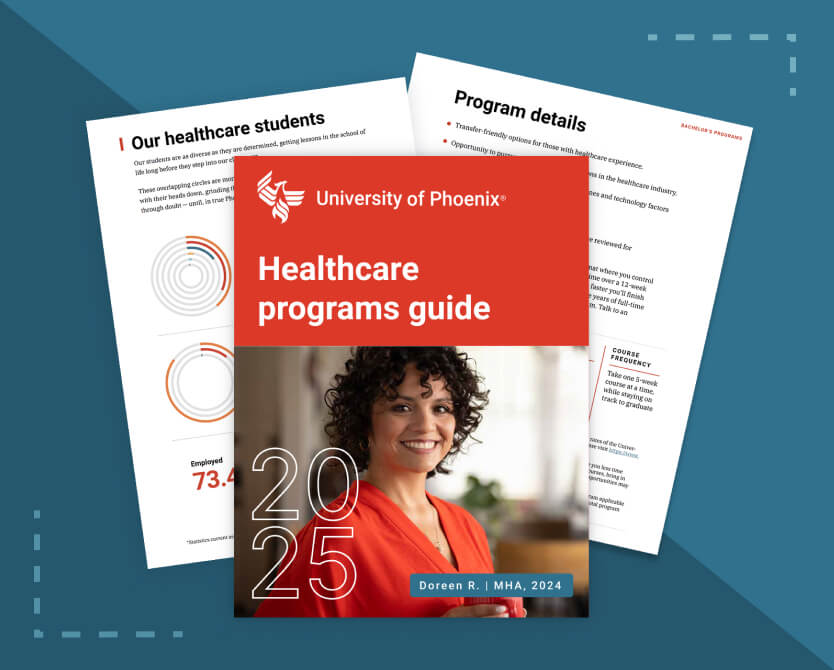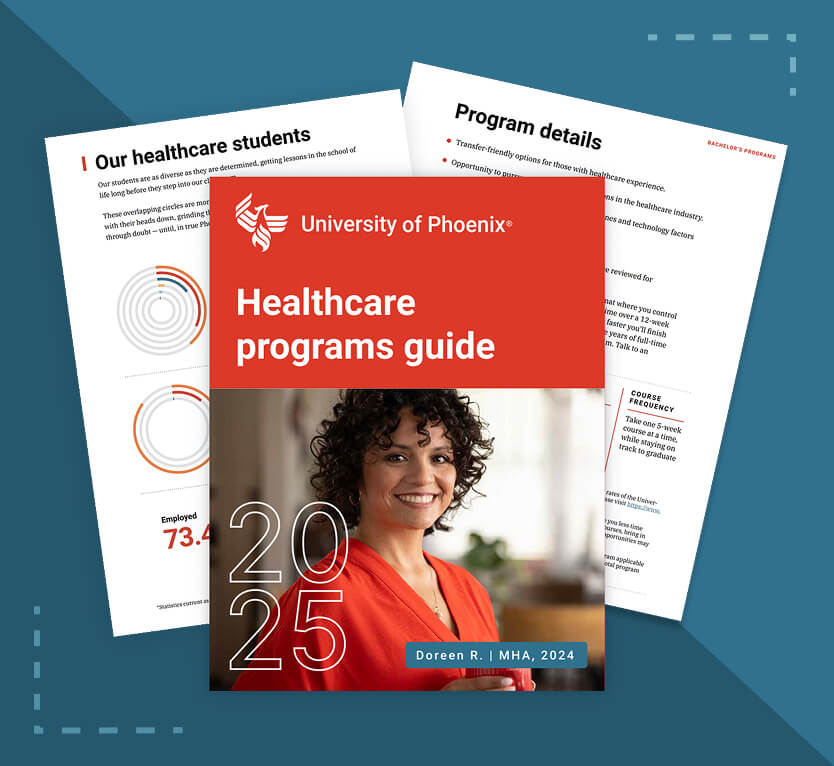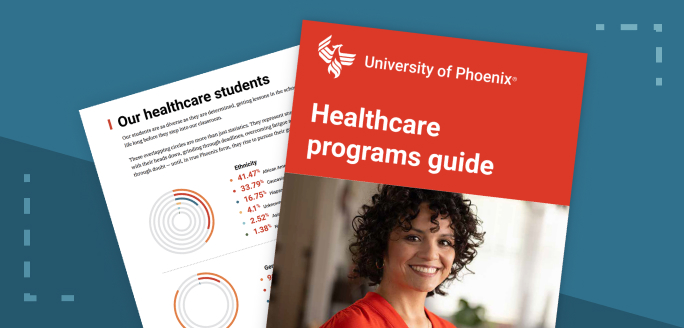Articles > Healthcare > What can you do with a healthcare administration degree?
What can you do with a healthcare administration degree?

Reviewed by Mark Jóhannsson, DHSc, MPH, Dean, College of Health Professions

Healthcare administration is one of the fastest-growing employment sectors in the U.S. According to the U.S. Bureau of Labor Statistics (BLS), employment of medical and health services managers is projected to grow 29 percent from 2023 to 2033, much faster than the average for all occupations. About 61,400 openings for medical and health services managers are projected each year, on average, over the decade.
BLS Occupational Employment Projections, 2022-2032 is published by the U.S. Bureau of Labor Statistics. This data reflects BLS’ projections of national (not local) conditions. These data points are not specific to University of Phoenix students or graduates.
Why get a healthcare administration degree?
A healthcare administration degree can lay the groundwork for several careers in the healthcare field, including practice manager roles, by providing relevant skills and information. This, combined with relevant work experience, can prepare you for a variety of positions that involve managing, directing, and planning and coordinating business activities within a field that affects many people’s lives.
According to the U.S. Bureau of Labor Statistics (BLS), employment of medical and health services managers is projected to grow 29 percent from 2023 to 2033, much faster than the average for all occupations. About 61,400 openings for medical and health services managers are projected each year, on average, over the decade.
BLS Occupational Employment Projections, 2022-2032 is published by the U.S. Bureau of Labor Statistics. This data reflects BLS’ projections of national (not local) conditions. These data points are not specific to University of Phoenix students or graduates.
A healthcare administration degree is great for students interested in business management and healthcare policies. There are many similarities when looking at healthcare management vs. healthcare administration but they are not the same thing. Healthcare administration tends to emphasize operations and patient experience, while healthcare management handles an organization’s overall financial health and strategic direction.
Careers with a healthcare administration degree
We’ve established that earning a bachelor’s or master’s degree can prepare you to pursue a role in this field. But what healthcare administration careers are available? Many of the following roles are subsets of the health services management profession, which accounts for similarities between job outlook, salary and job duties. As of May 2022, medical and health service managers earned between $64,100 and $209,990 annually, according to BLS. We’ll dive deeper into the different subsets and what their job overview looks like.
Salary ranges are not specific to students or graduates of University of Phoenix. Actual outcomes vary based on multiple factors, including prior work experience, geographic location and other factors specific to the individual. University of Phoenix does not guarantee employment, salary level or career advancement. BLS data is geographically based. Information for a specific state/city can be researched on the BLS website.
Health manager
Overview: Health managers may also be referred to as medical and health services managers. Their primary duties include overseeing parts of the healthcare system, ranging from specific clinical areas or departments to entire facilities. They develop goals and objectives for the facility and help ensure compliance with laws and regulations. Health managers must also recruit and supervise staff members, creating work schedules that allow the facility to run smoothly.
Education requirements: Health managers usually need a bachelor’s degree to enter the occupation, typically in health administration.
Health information management director
Overview: Health information management directors ensure databases for patient records are complete and accurate. They also help ensure that this information is accessible only to authorized personnel.
Education requirements: Health information management directors might be required to have an associate or bachelor’s degree. Those seeking leadership positions may benefit from a master’s in health administration.
Practice administrator
Overview: Practice managers and administrators have many shared responsibilities, but administrators focus more on the business side. They might oversee the operations for larger group medical practices, entire hospital departments or multispecialty medical clinics. In addition, their duties often involve higher-level administrative decisions, strategic planning and financial management.
Education requirements: Practice administrators typically have a bachelor’s degree or master’s in health administration, depending on employer needs.
How do you start a career in healthcare administration?
A common pathway to enter the healthcare administration field is to earn a Bachelor of Science in Health Administration.
It’s possible for healthcare professionals who have a clinical background to use online degrees to gain the necessary business skills to help them thrive in this role.
Pursuing a Bachelor of Science in Health Administration can help you embark on a rewarding career path in healthcare administration. In this program, you’ll typically learn the principles of dealing with such aspects of healthcare management as:
- Electronic health records
- Strategic planning
- Business communication
- Organizational behavior
- Financial management
Get started on a healthcare administration degree
If you don’t already have a healthcare administration degree, University of Phoenix offers several flexible, online degrees for the healthcare administration field:
- Master of Health Administration
- Master of Health Administration (Comptency-Based)
- Master of Health Administration with a concentration in Health Care Compliance and Privacy
- Master of Health Administration/Master of Business Administration
- Doctor of Health Administration
- Online healthcare certificate programs
Contact University of Phoenix for more information.
Watch What Can You Do with a Healthcare Administration Degree?

Mark Johannsson, DHSc, MPH
Dean, College of Health Professions
“The field of health administration is the framework, the underpinnings on which the U.S. healthcare system is hung. Although what most people consider ‘healthcare’ is what is more visible — the doctors, nurses, techs, etc. — but the truth is the vast majority of jobs are found within the diversity of health administration, but they are less visible. Health administration careers look like the people who help design the healthcare facilities, run the facilities, create the systems that guide the delivery of care, ensure delivery and quality of care, manage the reimbursement systems that fund healthcare, work in drug manufacturing operations, pharma sales, waste management operations. That is health administration.”

ABOUT THE AUTHOR
Brian Fairbanks is a freelance writer with a background in SEO content creation and blog article development

ABOUT THE REVIEWER
Mark Jóhannsson is the Dean of the College of Health Professions. He has a career spanning over 35 years of healthcare management, public health practice, higher education administration, teaching and clinical/behavioral research within corporate, community and academic settings. He has served as both an educational and keynote speaker, and he has been published in a variety of peer-reviewed and periodic literature.
This article has been vetted by University of Phoenix's editorial advisory committee.
Read more about our editorial process.




Get your free Healthcare programs guide
Explore our healthcare degrees and certificates - 100% of our programs are aligned to career-relevant skills.
You’re making moves!
This guide is loaded with answers. Download it now or get it from your inbox. Questions? We’re just a call or click away.
Get your free healthcare programs guide. Please enter your first and last name.
You’re making moves!
This guide is loaded with answers. Download it now or get it from your inbox. Questions? We’re just a call or click away.



